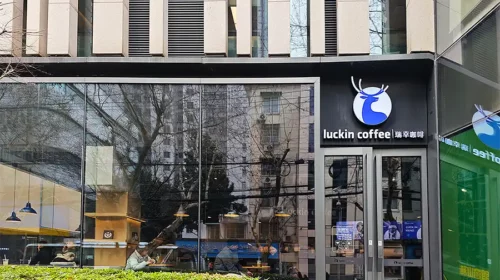CHINA BULLETIN: Mixed Messages in July PMI


In this week’s issue mixed PMI messages, a new data regulator and a coffee rebound. On a scale of 1 to 100, we give the week a 55 for offshore-listed China stocks.
Doug Young, Editor in Chief
You can sign up to get China Bulletin weekly in your inbox.
MACRO
Mixed Messages in July PMI
The latest PMI figures are sending mixed signals, with the services sector looking strong while manufacturing continues to struggle. The latest Caixin Services PMI came in at 54.1 for July, increasing from 53.9 in June. But the manufacturing PMI came in 49.2, dropping from 50.5. A figure above 50 represents expansion, while below that means the sector is contracting.
The dichotomy probably owes at least partly to who the two sectors target. Services is mostly aimed at the domestic market, which isn’t great but is generally holding up, at least for now. By comparison, a big chunk of manufacturing goes to exports, which have struggled for the last few months, including 12.4% and 7.5% declines in June and May, respectively.
U.S. Uneasy Over China’s Call for Public Assistance in Rooting Out Spies
U.S.-China relations were in the headlines last week, though less related to politics and more directed at Beijing’s latest campaign to protect its national security. The U.S. expressed its concerns to China over the country’s call last week for all citizens to assist in counter-espionage efforts, basically telling anyone and everyone to report suspicious activity.
This latest campaign extends a growing movement from the last couple of years, as China attempts to limit foreign access to data and information on activity in its domestic markets. Many foreign companies are increasingly concerned that they could be subject to criminal liability for simply collecting such data to better understand the China market.
China Stocks Exhale After Major Rally
The see-saw pattern of up again, down again continued last week for offshore-listed China stocks. The group posted modest declines last week after an impressive rally the week before, with the Hang Seng China Enterprises Index down 1.1%, while the iShares MSCI China ETF fell 3.1%. The broader Hang Seng Index fell 1.9%.
The relatively modest declines seem to reflect a sort of exhalation rather than anything larger, following the previous week’s big rally after Beijing indicated it would step up its efforts to support the economy. The week ahead is one of the biggest to date for second-quarter company earnings, which could dictate the tone for market sentiment.

Industry
Property Slump Infects State-Run Developers
The bleak news continues for China’s struggling property sector, with the malaise afflicting developers now spreading to state-run companies. Pain among developers was previously mostly confined to private companies. But now big state-run names like Sino-Ocean Group are also trying to restructure their heavy debt loads with their creditors, according to a Caixin report.
Meantime, separate new data shows that new property sales in July plunged 33.1% year-on-year, and were down 33.5% from June. The big sequential drop is partly seasonal, while the year-on-year decline owes to lack of new product coming into the market. That’s not surprising, since many developers now lack the funds to launch new projects and finish existing ones.
New Data Regulator Gets a Face
China has generally tried to streamline its huge bureaucracy in recent years, much of which is a legacy from its days as a socialist planned economy. But one area bucking that trend has been anything related to the internet and digital economy, which have become sensitive areas whose strict control are seen by Beijing as central to national security.
The latest addition to the data security ramp-up is the newly formed National Data Bureau, which will be led by telecoms bureaucrat Liu Liehong, the State Council said last week. Liu comes from China Unicom, one of the nation’s three big telcos, where he was chairman for the last two years. Such hopping between big state-owned companies and regulators is relatively common in China.
China Announces Pharma Crackdown, as Medical Exports Tumble
Two separate headlines last week show how China’s medical industry has boomed in the last few years. One saw China’s top graft-buster announce it will embark on a year-long crackdown on the nation’s pharma industry, while the other noted that the country’s medical exports fell 26.1% in the first half of the year as demand wanes for Covid-related products.
China’s recent medical boom has been powered by the dual engines of rising demand from a growing middle class at home, and demand from overseas. Domestic demand has produced a bumper crop of drug and device makers of variable caliber. Meantime, the nation also produces many items for foreign customers like medical masks and other protective gear.

Company
Luckin Comeback Marches On
The unlikely comeback story for scandal-tainted coffee chain Luckin continued last week, as the company released new data showing its revenue jumped 88% in the second quarter. But perhaps most significantly, the company’s revenue of $862 million overtook Starbucks’ latest quarterly China revenue of $822 million for the first time.
That milestone isn’t too surprising, since Luckin is opening new stores at lightning pace and now has far more than Starbucks in China. More precisely, Luckin had 10,836 China stores at the end of June, compared with 6,480 for Starbucks. Luckin has been able to expand so quickly by shifting to a business model that leaves most of the work of store openings to franchise partners.
Don’t Count Out Starbucks Just Yet
While Luckin now looks like the king of China’s coffee pot, we shouldn’t count out former leader Starbucks just yet. The U.S. coffee giant released its own latest earnings last week that showed its China same-store sales surged by 46% for in its latest reporting quarter, providing a bright spot to an otherwise lackluster earnings report.
While that rise looks impressive, it was possible because it came off an extremely low base during the year-ago quarter when Shanghai was under lockdown for the months of April and May. The rebound looks likely to continue for the rest of this year due to low year-ago comparisons. But after that it’s hard to say due to China’s slowing economy.
Evergrande Units Plunge on Trading Resumption
The picture wasn’t pretty last week as trading resumed after prolonged suspensions for two units of Evergrande, the poster child for China’s embattled real estate sector. Shares of the developer’s EV unit fell as much as 69% when trading resumed after a 16-month suspension, while its separately listed property management arm lost 50%.
Shares of the parent Evergrande remain suspended, however, as the company tries to restructure its massive debt. A resumption of trading in the main company will be critical to Evergrande’s future, as part of its wide-ranging restructuring plan involves debt-for-equity swaps, which would be meaningless if the company’s shares are untradeable.
AND FROM THE PAGES OF BAMBOO WORKS
| China’s ‘Dollar Store’ Rings Up Dividend Policy Last week we bought you the latest development from Miniso, sometimes jokingly referred to as China’s rip-off of Japan’s Uniqlo due to the close resemblance of Miniso’s logo and store format. But there was nothing Japanese about the latest news, which saw Miniso rolling out a dividend policy as part of a plan to start offering regular dividends. Such a plan would have been unnecessary just four or five years ago, when this kind of new economy company would have attracted western investors simply with its China growth story. But as we all know, that growth story is rapidly losing its luster. As that happens, a growing number of Chinese firms like Miniso are turning to dividends to try and keep investors interested. |
| Yum China Feasts on ‘Revenge Spending’ Diners Starbucks and Luckin weren’t the only ones reporting strong second-quarter rebounds last week. KFC operator Yum China also reported its own big rebound, with revenue and same-store sales up 25% and 15% for the quarter, respectively. While those figures weren’t as high as Starbucks’, we should note that Yum China wasn’t completely shut down during the Shanghai lockdown of 2022. Consumer activity has become patchy since an initial burst of “revenge spending” at the start of the year after China ended its “zero Covid” policy. Sellers of big-ticket items like cars and smartphones have seen sales weaken in recent months, while food and beverage operators like Yum and Starbucks have yet to feel a major impact due to the more affordable nature of their products. |






